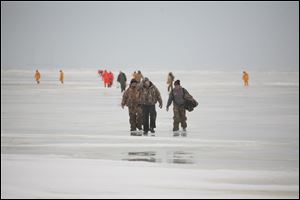
Lake Erie fishermen could be on thin ice
3/6/2010
CTY icerescue07p 02/07/2009 The Blade/Lisa Dutton Ice fishermen begin to make they way back to shore after being strand out in Lake Erie. Over 100 fishermen were trapped on Lake Erie because of cracks that developed in the ice when they were on the lake. When ice shifted in the windy weather, it caused the fishermen to be stranded about 1,000 yards off the shore. Emergency personell from Jerusalem Township and Lucas County were on the scene at Crane Creek State Park in Ottawa County, the fishermen were stranded off Magee Marsh in Lucas County.
Ice enthusiasts: Beware.
The U.S. Coast Guard is warning people to stay away from the ice on Lake Erie this weekend.
Warmer temperatures and shifting wind conditions projected for tonight and tomorrow will increase the chances of ice breaking off and forming floes.
That could leave people stranded if they get stuck on ice that breaks away, Coast Guard officials said.
"Anybody interested in going out fishing needs to be extra cautious," said Gregory Zerfass, senior chief at the Coast Guard station in Marblehead. "We've seen a very rapid deterioration of the ice in recent weeks, and with the forecast for this weekend, it's going to start melting away very quickly."
The warning applies primarily to the southern half of Lake Erie's western basin, which is still covered by extensive ice.
The northern part of the basin is ice-free.
Officials said they hope to avoid a repeat of last winter, when 134 fishermen had to be rescued after warm temperatures turned their fishing spot into a floe.
The rescue, which involved the U.S. Coast Guard and a score of local police, fire, and rescue departments, cost taxpayers an estimated $265,000.
Ottawa County Sheriff Bob Bratton said he was still angry that the fishermen rescued last year were not made to pay for their rescue. He said if anything similar happens this year, it will be up to the emergency agencies involved to decide whether to charge people. The U.S. Coast Guard does not charge for rescues.
Sheriff Bratton said he hoped people would use common sense and heed the warnings for this weekend.
"Ice fishing, I understand it, I appreciate it," the sheriff said. "But tomorrow, if there's a rescue there that goes on, I just don't have a lot of patience for that. It's negligent."
Chief Zerfass, whose station participated in last year's rescue, said ice fishermen appear to be taking more precautions this year, and rescues are down.
However, the chief said the decrease in rescues also may be because less favorable ice conditions have kept people away.
"I think the ice conditions are just different than last year, with ice constantly building up, melting, and refreezing," Chief Zerfass said. "It's just a different set of circumstances."
Marblehead has a new boat especially designed for ice rescues, Mr. Zerfass said. The 20-foot craft can be used for long-range rescues and accommodates more people than the aluminum boat the Coast Guard employed in last year's rescue.
The chief said his station received the boat in January as part of a scheduled equipment upgrade.
At Toledo's Coast Guard station, PO Paul Segura emphasized the danger posed by any kind of ice conditions.
"No ice is safe ice," Petty Officer Segura said. "Ice can start breaking up and can lead to unsafe situations."
Petty Officer Segura urged people to heed the warnings for this weekend. He also ran through a list of precautions people should take if they do go out on the ice. Those include:
•Telling someone where you're going and what time you'll be back.
•Going with another person.
•Taking a Coast Guard-approved life jacket and a whistle or other noise-maker.
•Carrying ice picks or screw drivers to pull yourself out of the ice if you get stuck.
•Wearing bright colors.
•Checking weather and ice conditions before you leave.
Contact Claudia Boyd-Barrett
at: cbarrett@theblade.com
or 419-724-6272.